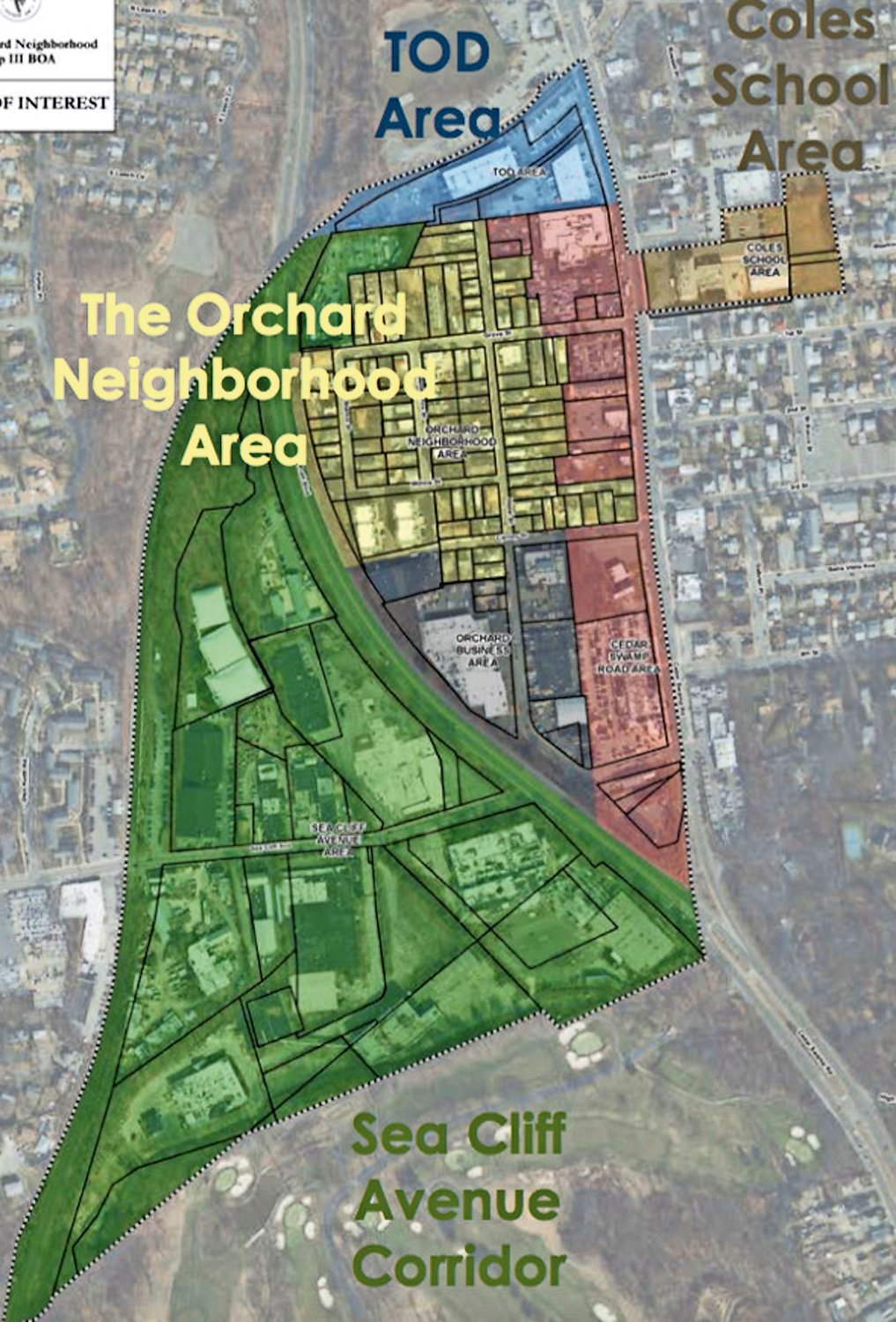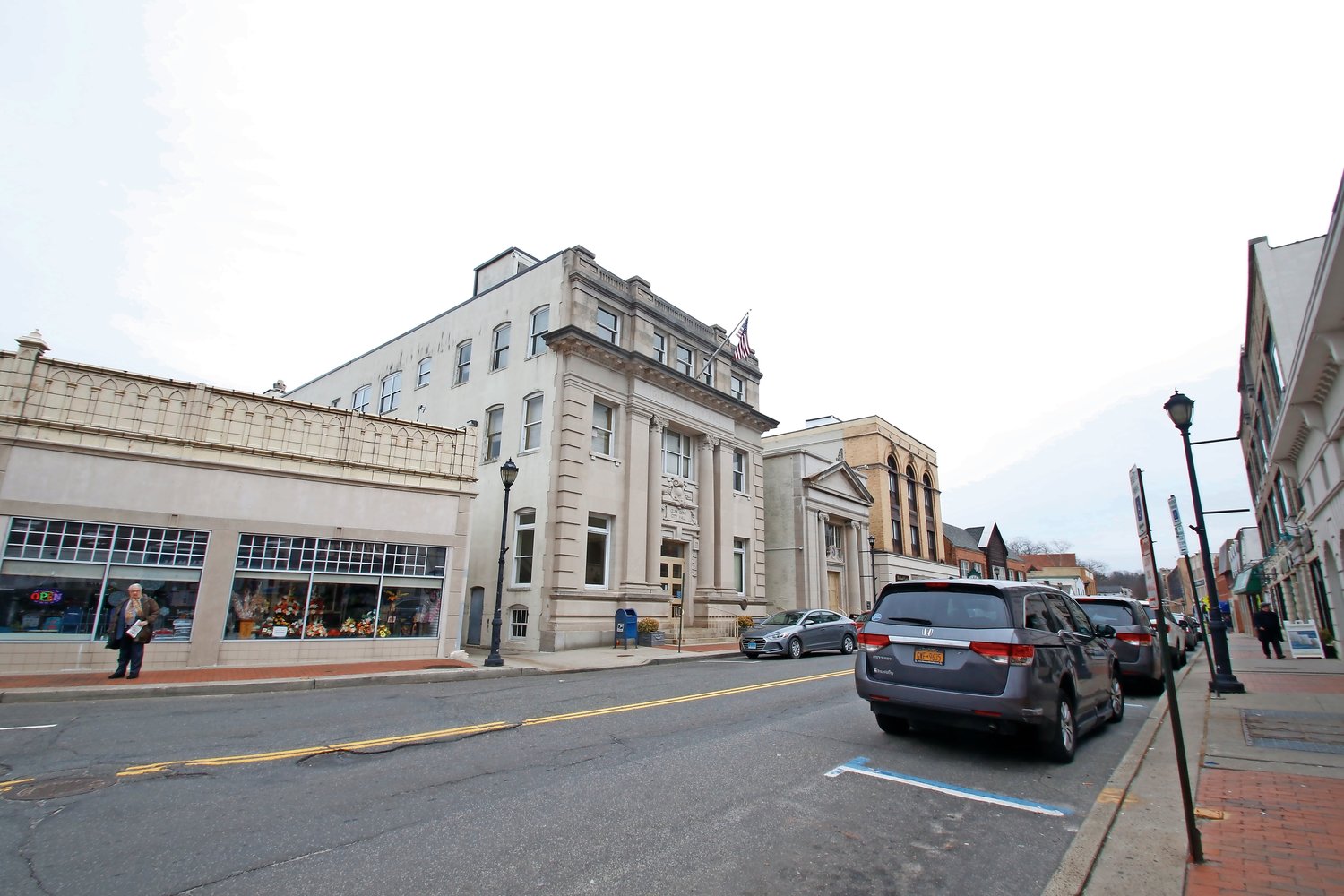Tuesday, April 16, 2024
 58.0°,
A Few Clouds
58.0°,
A Few Clouds
Orchard developments of concern to many
The Glen Cove City Council called a special meeting on June 27 in City Hall with the public’s voice in mind. Its aim was to allow residents of the city and surrounding communities to voice their opinions on what the city is considering in the revitalization of the Orchard neighborhood and Sea Cliff Avenue Corridor. There were no questions or dialogue, as the meeting’s purpose was only for the council to hear comments.
The area is considered a Brownfield Opportunity Area, which enables the city to seek state aid in performing revitalization projects.
Before the public comments began, Ann Fangmann, executive director of the Glen Cove Community Development Agency, made a presentation to update the public on the project. She said the city is currently in Step 3 of the BOA process, which involves using the results of past studies to determine the best means of revitalizing the neighborhood.
Under the State Environmental Quality Review Act, Step 3 must also involve studies on how the developments may affect the environment. Environmental planning firm Nelson, Pope & Voorhis has been enlisted to draft a General Environmental Impact Statement, which will be used to evaluate the recommendations issued by the BOA plan’s third step.
Now that the council has accepted the Draft GEIS, the public has a chance to issue comments on it, as well as on Step 3 of the BOA project. Those who could not attend the June meeting can submit written comments to the city until July 29. The BOA project plans will be modified and the GEIS will be adopted in the fall.
Only six members of the public spoke during the hearing, and half of them were from Sea Cliff, not Glen Cove. Several people brought up the issue of traffic, saying that navigating the roads around the BOA is hard enough now. The developments would increase the traffic, they said.
Sea Cliff Village Administrator Bruce Kennedy expressed concern about the residents of the Orchard, questioning if the developments were meant to benefit those already living in the neighborhood or to attract new people to the area. He also wanted to know whether residents would be able to afford to stay in the neighborhood.
Although no Orchard residents spoke during the public hearing, the risk of displacement has been an issue they have brought up on many occasions in the past. Many are concerned that the incoming developments could force them to lose their homes, either because their buildings may be demolished or that they will no longer be able to afford the increase in rent.
The neighborhood is heavily made up of Latino immigrants, who have said they are not being properly represented. In the days following the meeting, Nelson Melgar, a former Orchard resident who grew up in Glen Cove after immigrating from Honduras when he was 13, said he is “disgusted” by the displacement that those living in the Orchard may face. He said several residents have told him their landlords have notified them that they need to move as a result of the developments.
Melgar said he is upset that people may have to leave the homes they have had for decades and expressed frustration with the landlords and the city for not taking action against it. “They can’t even begin to understand the suffering and pain they’re going to cause these people simply because they want to beautify Glen Cove,” he said.
Orchard resident Ken Stedman said displacement has been at the forefront of his mind since he first heard of the developments. He is concerned that a rent increase would be too high he said, and worries his home may be torn down. Stedman worries he might become homeless. Although he is not opposed to renovating the neighborhood, he said he does not want it to come at the expense of its residents.
“I’m hoping that they don’t have to tear down homes to renovate it,” Stedman said. “I just hope I still have a home a year from now.”
For months, Fangmann has insisted that the BOA implementation itself will not cause the displacement of residents and that neither the city nor the CDA have used eminent domain or purchased any properties in the area. She said she was unaware of landlords telling Orchard residents they need to move and believes that they may be doing so to take advantage of opportunities that are outside of the city’s planning process.
Any building destruction that may occur would be done by private entities, Fangmann said, not the city. The only major development being proposed would be a combination of retail and housing in the area by the Glen Street Station at the northern end of the BOA. Jocelyn Wenk, a grant writer and administrator with the CDA, said this would come in the form of apartments above businesses in buildings that are already in the area.
Nonetheless, Melgar said he feels the Orchard should be left alone. He does not want people to have to find houses farther away or for children to have to start going to different schools. He said he believes these developments are not a good way to get more people to move to Glen Cove. Rather, he said, the city should focus more on improving things like the school district and transportation to attract new residents.
On what actions he believes the city should take with these developments moving forward, Melgar simply said, “To do what’s right for the people.”
The documents for the BOA Step 3 Implementation Strategy and Draft GEIS are available at www.glencove-li.us. Written public comments on the documents can be sent by mail to the Glen Cove CDA at 9 Glen St., Glen Cove, N.Y. 11542. Comments can also be emailed to BOAfeedback@glencovecda.org.
HELP SUPPORT LOCAL JOURNALISM
The worldwide pandemic has threatened many of the businesses you rely on every day, but don’t let it take away your source for local news. Now more than ever, we need your help to ensure nothing but the best in hyperlocal community journalism comes straight to you. Consider supporting the Herald with a small donation. It can be a one-time, or a monthly contribution, to help ensure we’re here through this crisis. To donate or for more information, click here.
Sponsored content
Other items that may interest you







